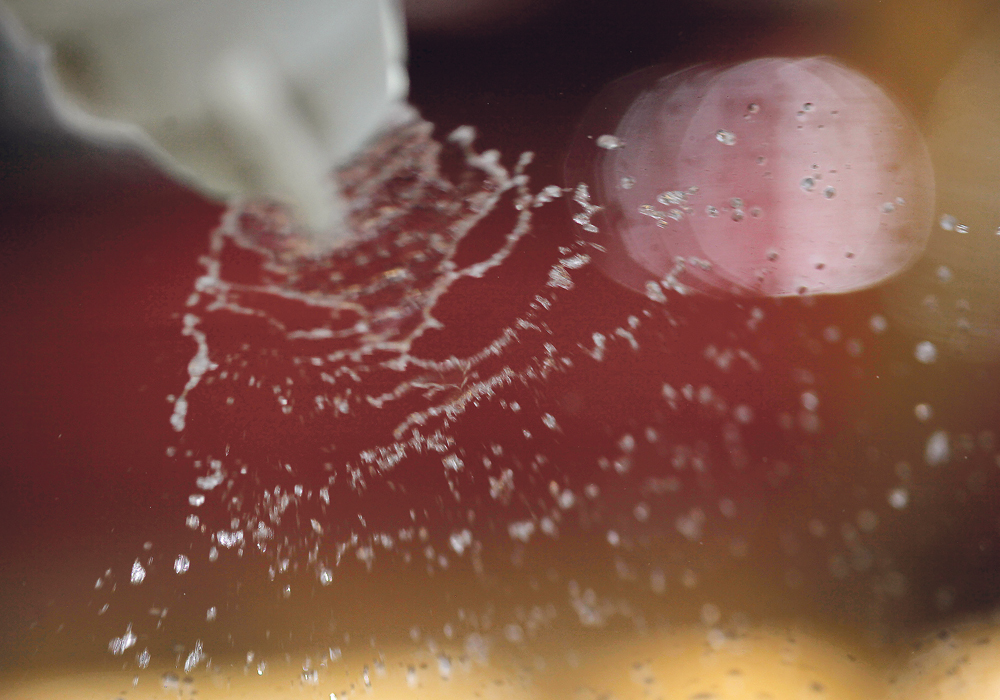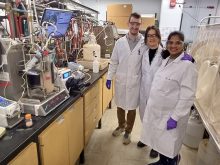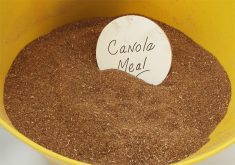Grain buyers and end users are increasingly asking producers for details about their production practices on the farm
BANFF, Alta. — Jason Lenz’s farm was one of the first in Alberta to discover wild oats resistant to Avadex.
It was an eye-opening experience and the impetus to keep better records of all farm activities, he said during a sustainability discussion at the Prairie Cereals summit held in Banff Dec. 11-12.
“There has been an increase in record-keeping on our farm. We have records of our herbicide rotation since 1987,” he said.
His family farms near Bentley, Alta., on a diversified operation of malt barley, CPS wheat and red spring wheat, canola and sometimes fababeans, along with a small cow herd.
Read Also

Manitoba farm group named finalist for national water innovation award
The Manitoba Forage and Grassland Association’s Aquanty Project for local hydrological modelling has earned them one of three finalist spots for a national award from Water Canada.
Attention to detail helped them become successful malt growers. They watched wheat yields grow when they adopted advanced practices.
The new reality is more grain buyers and end-users are asking farmers like Lenz details about what is going on at the farm.
Warburtons, the largest baking company in the United Kingdom, buys three specific wheat varieties from Canadian farmers. The relationship has existed for 140 years but in the early 1990s, Canadian wheat became problematic when some varieties did not meet their needs, said Adam Dyck, who represents the company in Canada.
Three varieties were found to fit their baking requirements and Warburtons started to contract with farmers to get what they wanted. Warburton requires detailed records, use of certified seed and grain segregation. For that, they will pay a premium.
Warburtons wants consistency in every shipment of wheat. The retailers who buy their products are pushing hard for information.
“If you don’t have the data to support your claims, it is very difficult to work with these companies,” Dyck said.
Pasta producer Barilla is emphasizing the sustainability agenda. A family owned company from Italy, it also has plants in the United States.
Globally, Barilla buys more than 1.5 million tonnes of durum annually. About 176,000 tonnes of that will come from Canada, said Greg Viers of Barilla America Inc.
Barilla has started a sustainability project in the U.S. and would like to bring it to Canadian durum producers.
“Sustainability is very important for Barilla because we must never forget what we pass on, we pass on what is left for our children,” he said.
Sustainability is also tied to the consumer, who wants to know how food is produced and where it comes from.
Walmart has developed a sustainability index survey for its suppliers and asks specific questions on conservation, production practices and yields.
“If you want to have products on Walmart’s shelves for sale, you better know the answers to these questions and you better be able to back them up,” he said.
Consumer desire is the motivating factor behind many of these initiatives.
“If you want access to the consumer, your practices need to be taken into consideration. There is a perception among some consumers that some of the practices that farms use may not be in the consumers’ best interests,” he said.
A big move is addressing public questions about the use of glyphosate.
“We get many, many questions about glyphosate weekly, monthly. We are trying to address our consumers’ needs and we are in the process of developing a low glyphosate supply chain,” Viers said.
The company is in the first year of a five-year plan to substantially reduce glyphosate use. In the first year, the company is offering a premium for durum with less than 40 parts per billion glyphosate residue. In five years they want 10 parts per billion or less.
“We know we cannot ask for discontinuance of use of glyphosate without paying a high price for that,” he said.
The change is based on the precautionary principle and is far tighter than Canada’s maximum residue for glyphosate, which varies depending on the product, but is stated in parts per million.
“For a food company not to take the position of being cautious with this issue, I don’t think it would be prudent for us not to take the cautious approach and that is what we are doing. There is opportunity from agriculture to try to change the perception. Because it exists there is a lot of risk for food companies.”
Barilla Italy is buying durum from other countries and is achieving the 10 parts per billion requirement.
“It can be done. We are paying a premium for it. We are taking this position because we believe it is a cautious position,” Viers said.


















